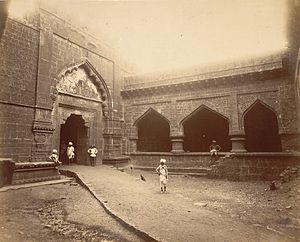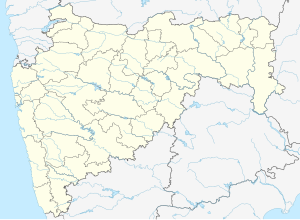Panhala Fort
| Panhala fort | |
|---|---|
| Panhala, Maharashtra | |

Inner gate of Teen darwaza c. 1894, Panhala fort
|
|
|
Shown within Maharashtra
|
|
| Coordinates | 16°48′32″N 74°06′33″E / 16.80889°N 74.10917°E |
| Type | Hill fort |
| Height | 845 m (2,772 ft) ASL |
| Site information | |
| Owner | Government of India |
| Controlled by | Bhoja II, Bijapur, Marathas, Mughals, East India Company |
| Open to the public |
Yes |
| Site history | |
| Built | 1178, 1489(major expansion) |
| Built by | Bhoja II, Adil Shah |
| In use | 1178–1947 |
| Materials | Stone, Lead |
| Battles/wars | Battle of Pavan Khind |
| Garrison information | |
| Past commanders |
Bhoja II, Ibrahim Adil Shah I, Shivaji, Aurangzeb, Tarabai |
| Occupants | Sambhaji, Ramchandra Pant Amatya |
Panhala fort (also known as Panhalgad(पन्हाळा,पन्हाळगड In Marathi), Pahalla and Panalla (literally "the home of serpents")), is located in Panhala, 20 kilometres northwest of Kolhapur in Maharashtra, India. It is strategically located looking over a pass in the Sahyadri mountain range which was a major trade route from Bijapur in the interior of Maharashtra to the coastal areas. Due to its strategic location, it was the centre of several skirmishes in the Deccan involving the Marathas, the Mughals and the British East India Company, the most notable being the Battle of Pavan Khind. Here, the queen regent of Kolhapur State, Tarabai, spent her formative years. Several parts of the fort and the structures within are still intact.
Panhala fort was built between 1178 and 1209 CE, one of 15 forts (others including Bavda, Bhudargad, Satara, and Vishalgad) built by the Shilahara ruler Bhoja II. It is said that aphorism Kahaan Raja Bhoj, kahan Gangu Teli is associated with this fort. A copper plate found in Satara shows that Raja Bhoja held court at Panhala from 1191–1192 CE. About 1209–10, Bhoja Raja was defeated by Singhana (1209–1247), the most powerful of the Devgiri Yadavas, and the fort subsequently passed into the hands of the Yadavas. Apparently it was not well looked after and it passed through several local chiefs. In 1376 inscriptions record the settlement of Nabhapur to the south-east of the fort.
It was an outpost of the Bahamanis of Bidar. Mahmud Gawan, an influential prime minister, encamped here during the rainy season of 1469. On the establishment of the Adil Shahi dynasty of Bijapur in 1489, Panhala came under Bijapur and was fortified extensively. They built the strong ramparts and gateways of the fort which, according to tradition, took a hundred years to build. Numerous inscriptions in the fort refer to the reign of Ibrahim Adil Shah, probably Ibrahim I (1534–1557).
...
Wikipedia

